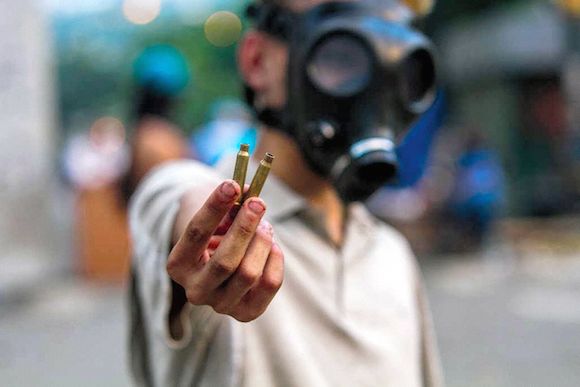Photo: THEASAHI SHIMBUN VIA GETTY IMAGES
Nescafé’s instant coffee machine at Maiquetía international airport only accepts 100 denomination bills. Twenty-five notes inserted later, a watery latte at a new standard price of 2,500 worthless Venezuelan bolivars is served. Inflation is one of the many problems President Nicolás Maduro’s government will continue to face regardless of the success of his recent power grab.
Venezuela’s president first announced in May he would be re-writing the constitution of his mentor and predecessor, Hugo Chávez, as a way to bring about “peace and reconciliation” after weeks of violent demonstrations against the shambolic state of the economy. A new assembly would be created, with the potential powers to dissolve the opposition-controlled parliament, scrap future elections and draft new laws. Its powers, in theory, even exceed those of the president himself.
Protests continued—more than 100 people have now been killed by security forces— but on the streets of Caracas there was never a sense that Maduro could be stopped. Neighbours setting up barricades from bits of old furniture in dutiful protest against plans to bring to an effective end 60 years of multi-party democracy felt helpless. Two-day civil strikes were not enough. Life will carry on, said one local baker whose business remained open on the first call to strike. The majority of those who can bring about change in Venezuela, he argued, are abroad. Those that are left will just “muddle through.” Thousands more fled across the border into Colombia the day prior to the vote for fear their country will become a one-party state.
At the end of July the vote to create the new assembly went ahead. The opposition boycotted the vote, but Venezuela’s national electoral authority claimed that more than eight million people, or 41 per cent of the country’s electorate, nominated candidates that will have the power to rewrite the constitution. That official turnout looked dodgy—even the British technology company that helped to run the public vote believes the result was rigged. Forgery or not, the 545-member assembly has already nominated a president and will act as a puppet parliament while in indefinite session.

Listening to Maduro on his weekly Sunday television show gives an indication as to where Venezuela is heading: the man tirelessly booming from the television set was not the voice of someone willing to back down or negotiate with the opposition.
International condemnation thus far has been ineffective, albeit noisy. Some 40 countries have expressed outrage at the “sham” election since the assembly was voted in. Even the Pope made a last-minute plea. Washington opted to sanction Maduro, but not the oil sector—widely considered a more effective threat to Venezuela’s petro-dollar economy. Instead the United States targeted his personal bank accounts, travel and business with American companies. For an anti-imperialist like Maduro, the impact of these sanctions is minimal. Any illicit funds are likely hidden elsewhere, well away from his northern foe.
Mercosur, South America’s languid regional trade bloc, suspended Venezuela’s membership indefinitely but has no power of expulsion. Crucially, both China and Russia have so far dismissed the international chorus. Russia rejected the outcries as “destructive” and sent a $1bn lifeline to state-controlled oil company Petróleos de Venezuela. China, which provides crucial aid and investment, has stayed silent.
The challenge to Maduro’s leadership, if it comes at all, may come from within. His socialist bloc is already splintering, while there are rumblings within the military. More of those once loyal to the Chávez project could break away. Delcy Rodríguez, Maduro’s former foreign minister, has been appointed as head of the new constituent assembly. She proved her loyalty to Maduro by immediately sacking his biggest threat, chief prosecutor Luisa Ortega—a one-time supporter of the president who had turned against him. But if the economy continues to slide and if the military’s concerns increase, Rodríguez may come under pressure to use one of her other newly-acquired powers—the power to dismiss the president.













